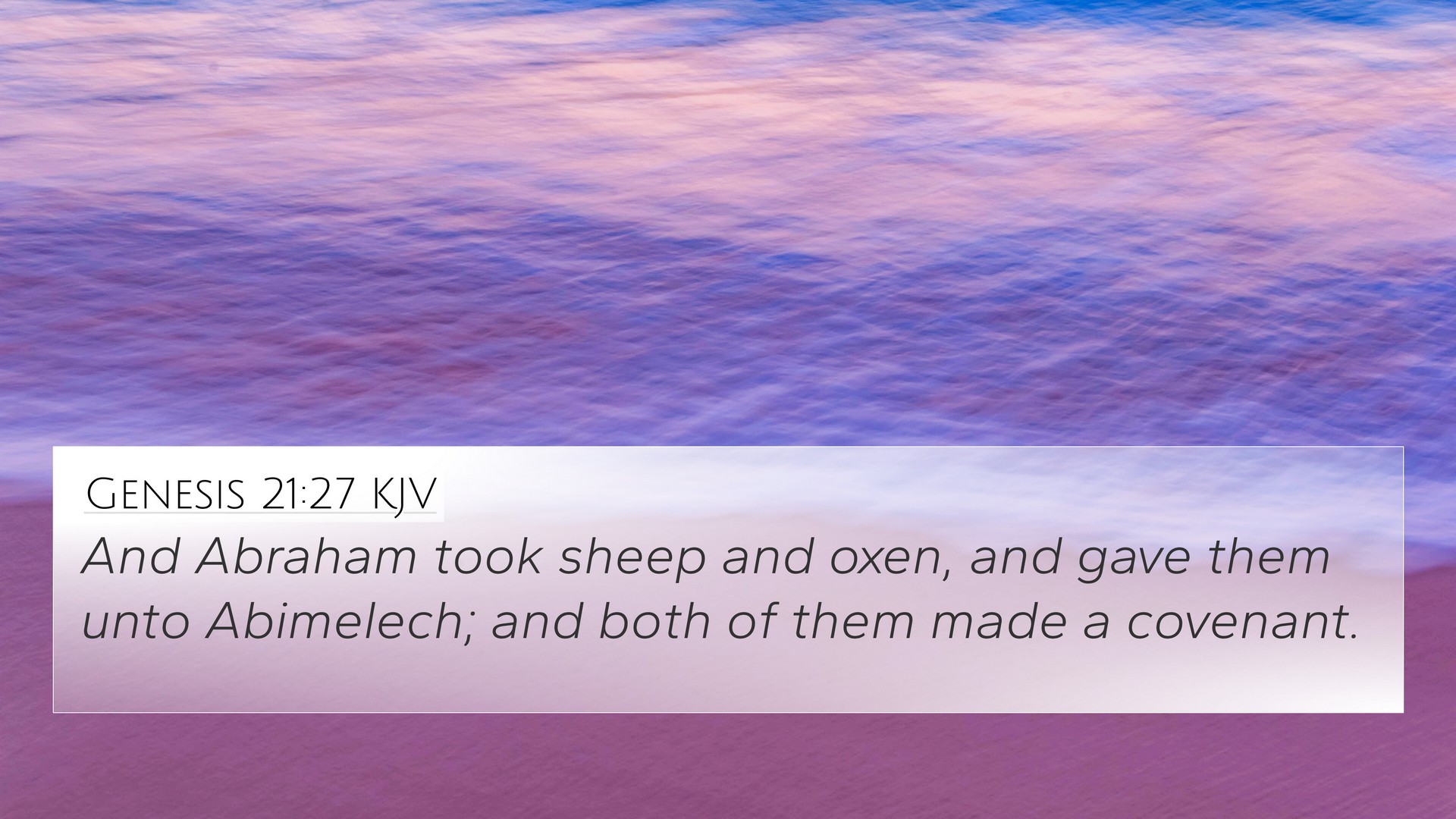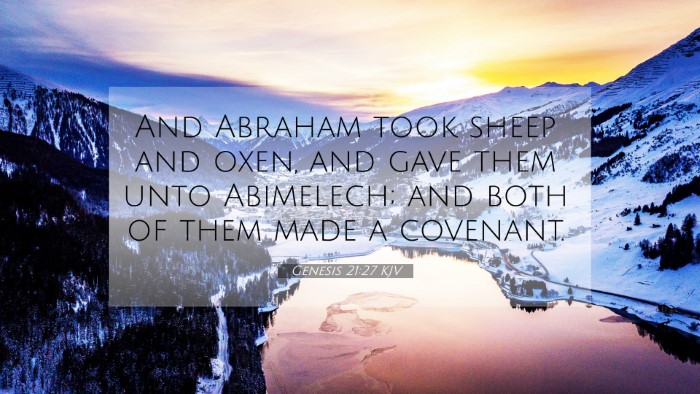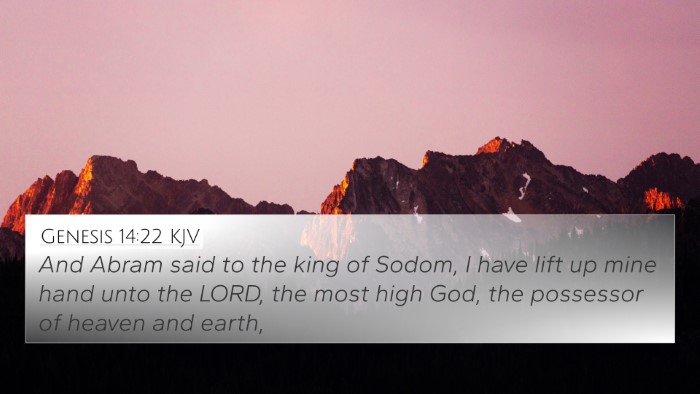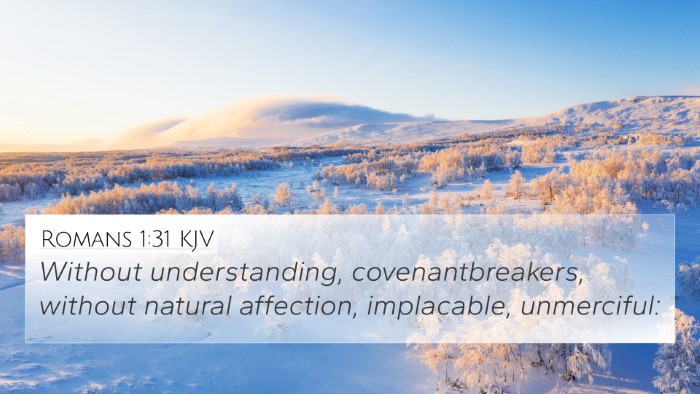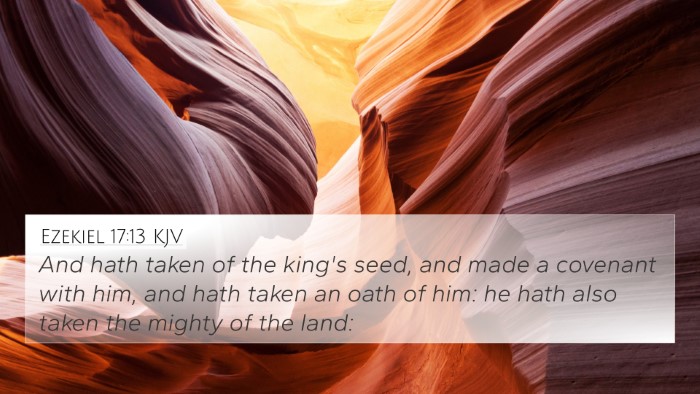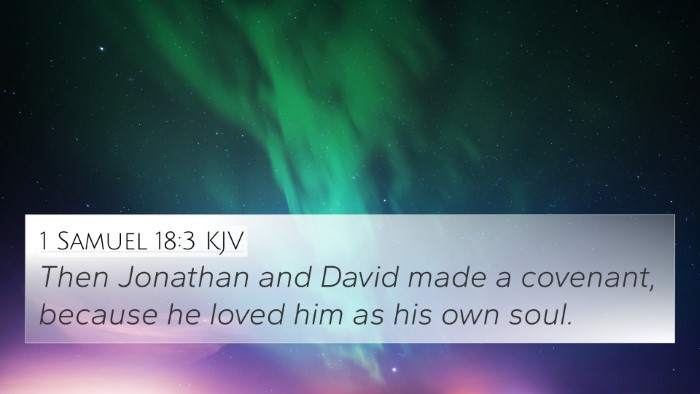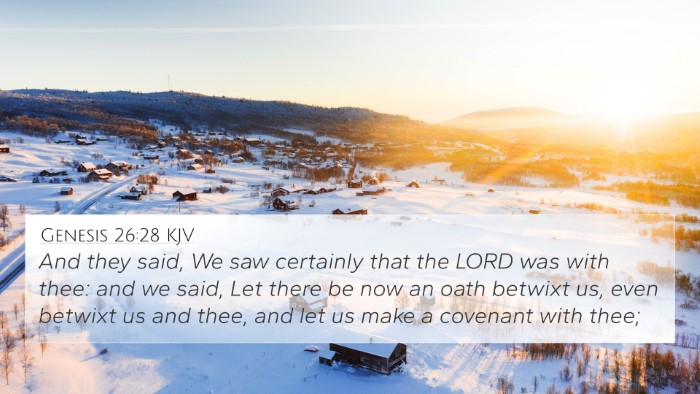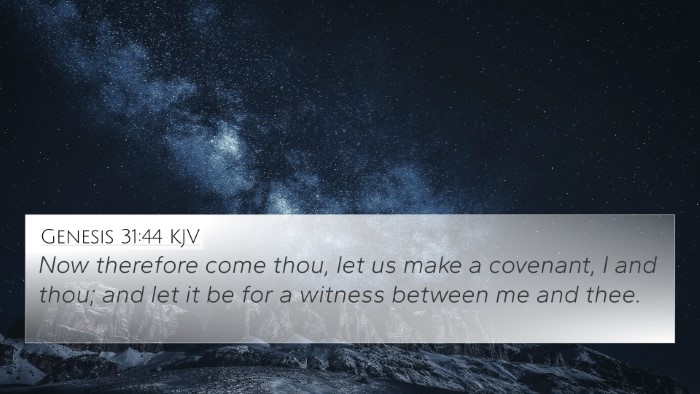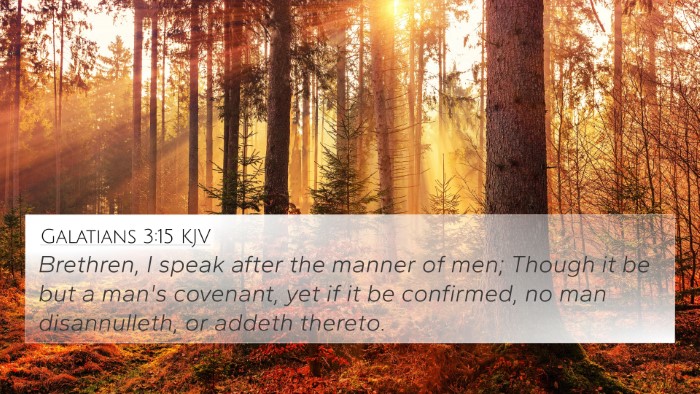Meaning and Interpretation of Genesis 21:27
Genesis 21:27 reads:
"And Abraham took sheep and oxen, and gave them unto Abimelech; and both of them made a covenant."
Summary of Insights from Public Domain Commentaries
This verse marks a significant moment in the relationship between Abraham and Abimelech, emphasizing themes of peace, integrity, and stewardship. The act of Abraham giving sheep and oxen symbolizes respect and serves as a tangible expression of the covenant made between the two men. Here, we amalgamate insights from several esteemed public domain commentaries including those written by Matthew Henry, Albert Barnes, and Adam Clarke.
Context of the Covenant
In the preceding chapters, we observe Abraham in his interactions with various inhabitants of the land. Abimelech, the king of Gerar, is a pivotal figure in this narrative, representing the surrounding nations that Abraham engaged with. The covenant, formed here, signifies not only a mutual agreement but also the recognition of godliness in relational dealings.
Matthew Henry's Commentary Insights
According to Matthew Henry, the act of making a covenant is deeply rooted in the concept of mutual commitments and is a precursor to the recognition of each other’s rights. Henry emphasizes that Abraham's generosity in offering livestock showcases his earnestness in establishing peace with Abimelech. This covenant is not merely political; it is deeply spiritual, reflecting Abraham’s understanding of integrity and righteousness before God.
Albert Barnes' Understanding
Albert Barnes notes the act of gift-giving as not only a cultural norm in covenant-making but also as a demonstration of goodwill from one party to another. He highlights that such agreements were regular in ancient times and served to secure peace and ensure cooperation between individuals or nations. Barnes underscores how the provisions made by Abraham serve both a practical and symbolic purpose in the assurance of their covenant.
Adam Clarke's Analysis
Adam Clarke adds an interesting perspective regarding the livestock mentioned. He suggests that these animals served both as a sacrifice and a testament to the commitment being made. Clarke points out that the covenant signifies a greater promise which echoes throughout the biblical narrative—one of unity and bearing witness to God’s promises for Abraham and his descendants.
Key Themes and Lessons
From this verse, several key themes emerge:
- The Importance of Peaceful Relations: The covenant signifies the importance of maintaining harmonious relationships with others.
- Godly Integrity: The actions of both Abraham and Abimelech show a commitment to ethical dealings, a principle that resonates throughout the Scriptures.
- Demonstration of Generosity: Abraham’s offerings denote a heart willing to give, which is a reflection of divine generosity.
- The Significance of Covenants: Covenants are a recurrent theme in the Bible, representing commitments made before God that require faithfulness.
Related Bible Verses
This verse can be connected to several other passages in the scripture that reinforce its themes and insights. Here are 8 cross-references for further study:
- Genesis 15:18: Describes the covenant God made with Abraham, formally establishing his lineage and future.
- Genesis 26:28-29: Another covenant made between Isaac and Abimelech, showcasing a pattern of treaties among Abraham's descendants.
- Genesis 31:44: Jacob and Laban make a covenant to ensure their mutual peace and prosperity.
- Exodus 20:16: Reflects the importance of truthfulness and integrity in covenants.
- Deuteronomy 7:9: Discusses the faithfulness of God to His covenant, emphasizing the relational aspect of agreements with Him.
- 1 Samuel 18:3: The covenant established between Jonathan and David showcases the deep bonds formed through mutual commitments.
- Psalms 25:10: Highlights that God's paths are steadfast love and faithfulness for those who keep His covenant.
- Hebrews 6:13-14: Discusses the nature of God’s promises and covenants, understood through faith and patience.
Thematic Connections and Insights
Genesis 21:27 serves not only to narrate a historical interaction but also to speak to the heart of the covenant theme found throughout the Bible. The examination of this verse reveals rich connections to God’s covenant with Abraham as well as the mutual agreements seen in later narratives stretching into the New Testament. This anticipatory link shows the unfolding plan of God through human relationships.
When exploring how different biblical texts interconnect, one recognizes the consistent call for integrity, faithfulness, and the centrality of covenants in the believer's relationship with God and with others. These interactions highlight how human lives are thoroughly interwoven with divine promise, reflecting a profound theological narrative inherent in biblical literature.
Conclusion
In summary, Genesis 21:27 exemplifies the biblical principles of integrity, the importance of establishing peaceful relations, and the depth of covenants. The insights gained from Matthew Henry, Albert Barnes, and Adam Clarke enrich understanding and can aid in cross-referencing biblical texts, enhancing one’s study of both Old and New Testament themes.
This exploration invites believers to reflect on their own covenant relationships in light of biblical teaching, encouraging an inter-Biblical dialogue that supports a better grasp of God’s overarching narrative and promises.
Further Study and Tools
For those interested in deeper study, utilizing a Bible Concordance, engaging in Cross-reference Bible Study, or leveraging a Bible Cross-reference Guide can be invaluable resources. These tools can elucidate connections between scripture, enabling one to uncover profound insights into God's Word.
